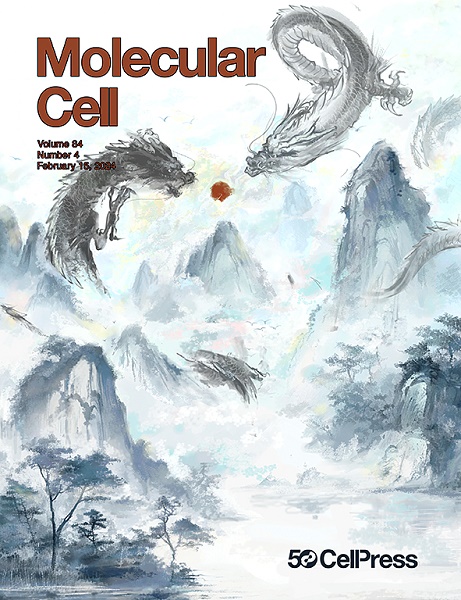Mediator regulates transcriptional termination through crosstalk with pre-mRNA 3′ end processing factors
IF 14.5
1区 生物学
Q1 BIOCHEMISTRY & MOLECULAR BIOLOGY
引用次数: 0
Abstract
Beyond its function in transcription initiation, the Mediator complex coordinates the processes of transcription elongation and mRNA splicing. Here, we report that Mediator associates with the cleavage and polyadenylation specificity factor (CPSF) complex in the pre-mRNA 3′ end processing machinery, partially through the MED23-FIP1 connection, for control of transcription termination in human cells. We observed the physical association and coordinated occupancy of MED23 and FIP1 at both promoter and terminator regions and found that MED23 directly binds to hundreds of 3′ mRNAs. Depleting MED23 or FIP1 or overexpressing the intrinsically disordered regions (IDRs) of FIP1 compromised the Mediator-CPSF association and reduced the genomic occupancy of CPSF. Consequently, MED23 deficiency led to hundreds of readthrough events and fusion transcripts, and the 3′ RNA binding of MED23 is critical for the transcription termination regulation. Moreover, integrative analysis revealed that MED23 deficiency contributed to readthrough events in breast cancers, thus providing critical molecular insights into carcinogenesis.

中介体通过与前mrna 3 '端加工因子的串扰调控转录终止
除了在转录起始中的功能外,中介复合物还协调转录延伸和mRNA剪接过程。在这里,我们报道了Mediator与pre-mRNA 3 '端加工机制中的切割和聚腺苷酸化特异性因子(CPSF)复合物相关,部分通过MED23-FIP1连接,以控制人类细胞中的转录终止。我们观察了MED23和FIP1在启动子和终止子区域的物理关联和协调占用,发现MED23直接结合数百个3 ' mrna。耗尽MED23或FIP1或过表达FIP1的内在无序区(IDRs)损害了介质-CPSF的关联并减少了CPSF的基因组占用。因此,MED23缺陷导致了数百个读透事件和融合转录物,而MED23的3 ' RNA结合对于转录终止调控至关重要。此外,综合分析显示,MED23缺陷导致了乳腺癌的读透事件,从而为癌症发生提供了关键的分子见解。
本文章由计算机程序翻译,如有差异,请以英文原文为准。
求助全文
约1分钟内获得全文
求助全文
来源期刊

Molecular Cell
生物-生化与分子生物学
CiteScore
26.00
自引率
3.80%
发文量
389
审稿时长
1 months
期刊介绍:
Molecular Cell is a companion to Cell, the leading journal of biology and the highest-impact journal in the world. Launched in December 1997 and published monthly. Molecular Cell is dedicated to publishing cutting-edge research in molecular biology, focusing on fundamental cellular processes. The journal encompasses a wide range of topics, including DNA replication, recombination, and repair; Chromatin biology and genome organization; Transcription; RNA processing and decay; Non-coding RNA function; Translation; Protein folding, modification, and quality control; Signal transduction pathways; Cell cycle and checkpoints; Cell death; Autophagy; Metabolism.
 求助内容:
求助内容: 应助结果提醒方式:
应助结果提醒方式:


